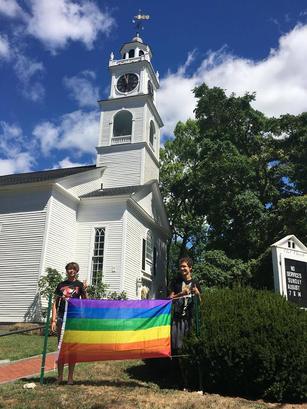 My Facebook feed is full of statements opposing the rise of white supremacy. Ministers tend to like words. We also expect to speak out on issues that we find important. There is no way in the world that one could look at what happened in Charlottesville and see anything other than a potential turning point in race relations. Which way will we turn? I do believe that among the many, many markers of the rise of the radical right this weekend will stand out. Therefore, I have been reading and talking and listening along with everyone else. In fact, there has been a part of me that wonders if there is anything left for me to say that hasn't been said better by others. For a moment I even thought of letting this pass and to wait for another news cycle to bring a new set of offenses. However, speaking out is something we all have to do. Besides, otherwise I am just walking around angry anyway. So I thought I would point out a few markers in the internet sea that make the anti-racist/anti-fascist case better than I can. Each of them gets to specific concerns (among many) that I have and that many of you have as well. Paul Krugman, in his column "When the President is Un-American" opens with a reminder of Sarah Palin's "real America" phase. You will remember the concept. It isn't difficult as many people right, left, and center, fall into it's trap. "Real" America--according to many--is populated by a strangely simplified form of "rural" or "working class" whites. We raise them up as examples of what we perceive as American virtues. The problem is that when we do this (whether we mean to or not) we have instantly labeled everyone else as less "real" and therefore less worthy. Liberals do this, too, by the way. Right now there is a lot of talk in the Democratic party about "reclaiming the base". Along with this effort, there is little thought given to the risk of romanticizing the crueler part of whiteness that--as we have seen this week--simmers beneath the surface. Perhaps they (we) do it unconsciously and without reflection. However, when we ascribe greater authenticity to one group, we give them greater power. Their narrative then controls the conversation. My faith tells me that all humans--and that would include all Americans--are equally "real". This is a bedrock of the theology I preach. However, it is a challenge to assert that position when so much of the noise around us tries to tell a different story. That is why speaking out is important, even if it feels like our position has already been said, and said with more art than we can muster. But I digress: Krugman's article is an indictment of the President, who has inhabited the "real America" narrative of his base. Donald Trump has increased the noise in what at best can only be called a failure of leadership. In many ways, the stoking of this narrative has led directly to society's apparent new comfort with white supremacist language. The results of that should be obvious. On the same day and in the same paper Michael Eric Dyson wrote "Charlottesville and the Bigotocracy" I don't feel the need to add much commentary. He refines the point that Krugman makes until it cuts with surgical precision. He quotes LBJ saying "If you can convince the lowest white man he's better than the best colored man, he won't notice you are picking his pocket". To me that is an accurate--if somewhat dated in its language-- description of how myth of "realness" functions. Dyson concludes with a call to people like me. "Now is the time for every decent white American to prove he or she loves this country by actively speaking out against the scourge this bigotocracy represents. If such heinous behavior is met by white silence, it will only cement the perception that as most white folks are not immediately at risk, then all is relatively well." This article has reminded me once again that I need to finally get through his book "Tears We Cannot Stop: A Sermon to White America". Finally, I have one more item. This is an old film first shown in 1943 and then edited and rebroadcast (as far as I can tell) in 1947. "Don't Be a Sucker" is many things. I see it as a classic noir PSA. The narrative of America it provides us, though, is still a powerful antidote to the rhetoric we are hearing from the alt-right, the fascists, and many in the conservative establishment, Many folks have been linking the tw0-minute clip. If you can stand it, however, I suggest you watch the whole thing below. It is jumpy and the beginning feels like a non-sequitur at first. That said, I am glad I stuck with it. It made me uncomfortable in parts. However, it made me ask why... Oh yeah... and the American Nazi? He talks about "real Americans" too.
0 Comments
Leave a Reply. |
Adam Tierney-EliotThis is my old weblog of many years. I will probably post here from time to time is there is a subject that does not fit WWG. However WWG is the more active page at this point. Archives
April 2022
Categories
All
|
 RSS Feed
RSS Feed